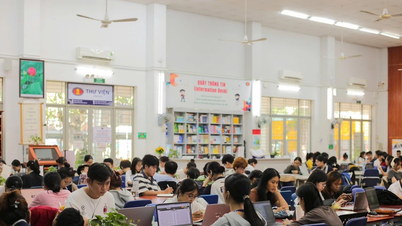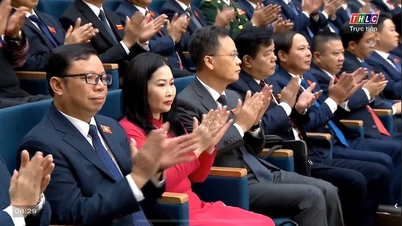Strategic move
According to education experts, gradually making English the second language in schools is a strategic task, in line with the integration trend and socio -economic development.
Dr. Ho Van Han - Head of the Faculty of Foreign Languages, Nguyen Tat Thanh University, said that the key factor to achieve the above strategic goal lies in the teaching staff.
Dr. Han cited the survey results of the Department of Education and Training of Ho Chi Minh City on the English proficiency of teachers in Ho Chi Minh City, out of 50,278 teachers, 9.45% of teachers reached A1 level; A2 was 11.35%; B1 was 35.09%; B2 was 13.63%; C1 was 3.69%; C2 was 0.29% and other levels were 26.5%.
From this result, we can see a worrying fact: the number of teachers with B1 level or lower is high.
Dr. Han believes that with such language ability, implementing teaching subjects and English as a second language in the classroom is almost impossible.
"If teachers are not qualified, the risk of using incorrect terminology, pronunciation, vocabulary or structure is very high. The consequences are not only that students receive inaccurate subject knowledge but also form incorrect language habits, directly affecting their ability to receive and apply English in practice," said Dr. Han.

On the learner side, English proficiency is also limited. According to data from high school graduation exams, the percentage of candidates with below average scores in English remains high: nearly 45% in 2023; 42.67% in 2024 and more than 38% in 2025.
In the 2025 10th grade entrance exam in Ho Chi Minh City, more than 31% of candidates scored below 5 points in English. "These figures clearly reflect the uneven English proficiency of students, creating many challenges in the teaching and learning process," Dr. Han emphasized.
Synchronized route
To realize the strategic goal, according to Dr. Ho Van Han, a long-term and synchronous roadmap is needed. He proposed that in the period 2025 - 2030, pedagogical universities and teacher training institutions must be pioneers in innovation, with at least 70% of courses taught in English, and the output standards of pedagogical students need to be raised to at least level B2.
At the general education level, from primary to high school, it is necessary to specifically list the subjects that can be taught in English, and at the same time develop a roadmap and budget to support teachers in participating in English training courses, ensuring that English proficiency meets teaching requirements.

In addition, English proficiency survey and class classification also need to be focused on.
For students who have not met the required proficiency standards, the school needs to implement English enhancement programs until they meet the entry level before participating in the main course.
The Head of the Faculty of Foreign Languages, Nguyen Tat Thanh University, said that after 2030, the Departments of Education and Training need to conduct screening, replacement and supplementing staff, aiming for the goal of 100% of subjects being able to be taught in English in places with conditions.
However, Dr. Han also frankly said: "This is a challenging task, raising big questions about the determination and financial resources of the entire education sector."
To improve teachers' capacity, universities, including Nguyen Tat Thanh University, need to closely coordinate with the Department of Education and Training to implement specialized English training programs (ESP), linked to specific subjects such as Mathematics, Physics, Chemistry, History, Geography, etc., in addition to practicing language skills. Thanks to that, teachers not only meet English proficiency standards but also have the ability to flexibly apply them in practical teaching in the classroom.
"With the experience and orientation of Nguyen Tat Thanh University, raising English standards for teachers and students and gradually turning it into a second language in schools will no longer be a distant prospect, but a completely achievable goal," Dr. Han affirmed.
Source: https://giaoducthoidai.vn/thach-thuc-va-lo-trinh-dua-tieng-anh-thanh-ngon-ngu-thu-hai-trong-truong-hoc-post749587.html





![[Photo] Joy on the new Phong Chau bridge](https://vphoto.vietnam.vn/thumb/1200x675/vietnam/resource/IMAGE/2025/9/28/b00322b29c8043fbb8b6844fdd6c78ea)
![[Photo] The 4th meeting of the Inter-Parliamentary Cooperation Committee between the National Assembly of Vietnam and the State Duma of Russia](https://vphoto.vietnam.vn/thumb/1200x675/vietnam/resource/IMAGE/2025/9/28/9f9e84a38675449aa9c08b391e153183)
![[Photo] High-ranking delegation of the Russian State Duma visits President Ho Chi Minh's Mausoleum](https://vphoto.vietnam.vn/thumb/1200x675/vietnam/resource/IMAGE/2025/9/28/c6dfd505d79b460a93752e48882e8f7e)




























































































Comment (0)